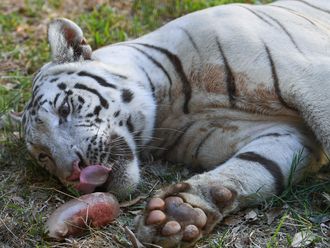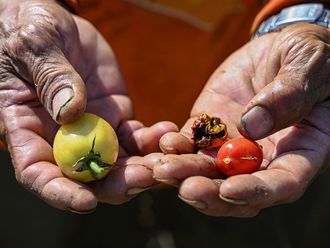Manila: A multi-sectoral environmentalist group is opposing a government plan to burn seized elephant tusks, as they said the idea would further harm to the environment.
The government had planned to destroy five tonnes of elephant tusks confiscated from illegal traders over the years to send a message to poachers and ivory connoisseurs that the country will not tolerate trading in wild species, but the EcoWaste Coalition said the idea may convey the wrong impression to people.
In a letter addressed to Environment Secretary Ramon Paje and Theresa Mundita-Lim, Protected Areas and Wildlife Bureau Director, the EcoWaste Coalition expressed opposition to the plan to burn the tusks as such would contribute to air pollution.
“At the outset, let us state that we are in full support of the global effort to stop illegal wildlife trade under the Convention on International Trade in Endangered Species of Flora and Fauna (Cites) ... However, burning the confiscated tusks goes against the prohibition against the open burning of municipal solid waste enshrined in two of our major environmental laws: Republic Act (R.A.) 9003, the Ecological Solid Waste Management Act and R.A. 8749, the Clean Air Act,” the EcoWaste Coalition said.
It further said that even if the intent is only to conduct “ceremonial burning,” such an act would likely send a confusing message to the general that open burning is acceptable.
“A photo showing the Environment Secretary setting a pile of tusks on fire may be interpreted as a tacit endorsement that open burning is okay,” EcoWaste warned.
The coalition said that instead of open burning, it suggested that the seized ivory be “simply crushed and pulverized by a road roller until the tusks are rendered useless to traders.
“The eco-burial site can serve as a lasting memorial to our country’s commitment to ending illegal wildlife trade and to poaching that is mercilessly killing the elephants. It will be fitting to install a marker at the site made out of combined cement and crushed tusks in memory of the murdered elephants,” EcoWaste said.
The DENR had planned to burn the seized tusks on June 21 as part of the highlights of the national celebration of Environment Month.
“Our decision to destroy these ivory tusks that entered the country illegally is to show to the whole world that the Philippines will not tolerate illegal wildlife trade,” Paje said.
Elephants are listed in Appendix 1 of Cites, which means they are highly endangered, and are banned from international trade. Cites said the high demand for ivory found in elephant tusks drives the killing of the animal, especially in Africa.
Some of the ivory taken from elephant tusks end up as religious icons that adorn churches in the predominantly Catholic Philippines.
In 1997, the Conference of Parties of Cites included the Philippines as one of nine countries of priority of concerns as regard illegal ivory trade, particularly its role as a trade route and transit country for elephant tusks.
The other eight are Kenya, Tanzania and South Africa, which are considered as major sources of ivory in illicit trade; China and Thailand as destinations of illegal ivory; and Hong Kong, Malaysia and Vietnam as trade routes and transit countries.












